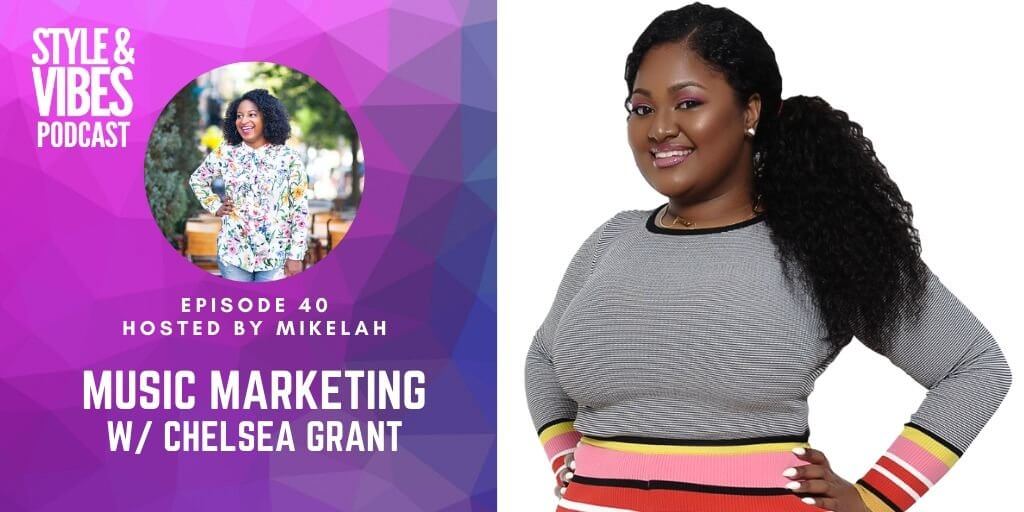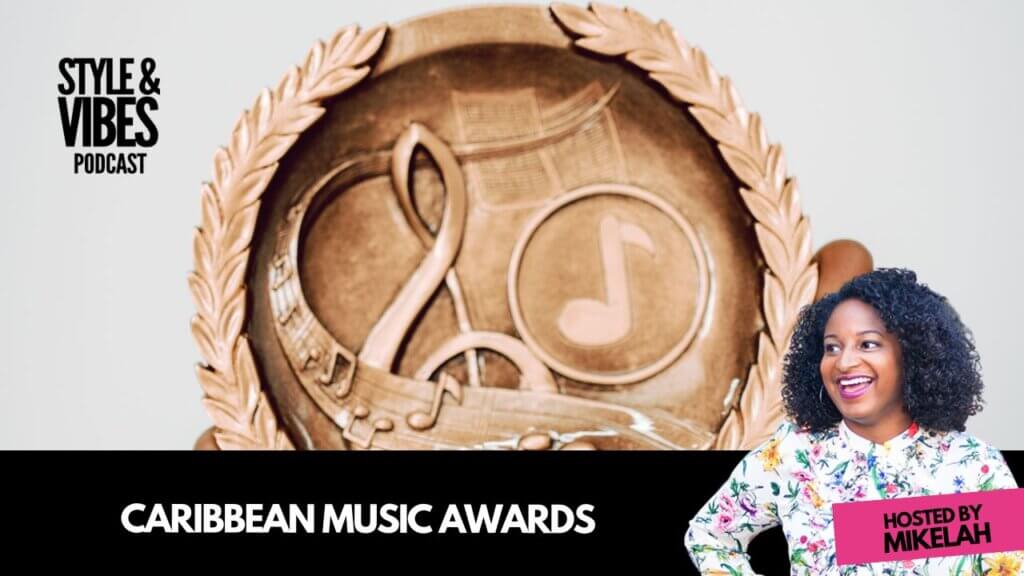
Apple Podcast | Spotify | Google Podcast | Stitcher
Produced by Breadfruit Media

In this episode we’re talking to music marketing maven Chelsea Grant, she been in the music and entertainment industry for a few years now and recently joined Caribbean record label VP Records as a Project Manager working with album launches for Chris Martin, Busy Signal, Jah Cure and many more. We talk about the consumption of music and trends that I thought it would be a great idea to talk more about the business side. While we get to learn about her journey, she gives some insightful gems about the state of the music business, the actual impact and value of reggae/dancehall and what artist can do to continue to grow in the business.
Stylin’ on: Signature Style & Vibes Sweatshirt
Vibin’ to: Busy Signal “Parts of the Puzzle”
On her background and how she grew her career in the entertainment industry.
I was an English major before I started my internship at JAMROCK Magazine. I wrote down a list of people that I wanted to meet and David Annakie was one of the persons who ran JAMROCK Magazine. I did and got an internship. That internship blossom a lot of things for me. From then on, I went on some writing for different magazines as well, doing my own radio show, I kind of did my own thing and then came back in this industry, but in a different type of position.
On her role at VP Records as a Project Coordinator
Sometimes things don’t always happen on your time. I interviewed with them (VP Records) three, four years ago, and I didn’t get the position that was there. But they kept seeing me everywhere, working with different DJs, artists and showcases, and one day they gave me a call. It was like a two year long process to get the job. I kept working in industry, even though I didn’t have that title, or the company behind me. I found opportunities that made sense. There’s someone that told me that, “you can’t n be used if you’re not useful.” I took that to heart. You have to have something to offer, so whether I was doing work for free for people or sometimes getting paid, I was making sure that I was in it the entertainment industry in some way.
(In my role) I’m in touch with all the different departments from A&R to the art department, the publishing, and of course, the marketing side and all those departments so that we can roll out the plan and execute for the artists’ album. I’m the liaison between what their vision is and what the label can execute. It’s hard for people to understand because they think like a one task; we become money managers, we become best friends if we need to be. We do everything we need out and fill in. Where’s needed in order to move the project along and make sure that the deadlines they me.
What she enjoys most about being in the industry.
There’s two things. When you have an idea that you’re able to bring into fruition and you can complete it, and finish it is such a joy and satisfaction, knowing that you can do something you love, the industry you’re in, and you can be impactful. The other portion of it is when the artists are really satisfied with the rollout of your marketing plan.
The first project with my name on it was Christopher Martin’s album And Then. We watched the Billboard report to see if it would be at number one. When it hit number one, like I got the email, I clicked it open on jumped up on my desk! I was just really excited. I’m really excited that we put a plan together. We put the hardworking, you had the artist come up, we went to different schools, visit kids, you know, there’s a lot of different things going on to get that done. That was one of the ones I was particularly proud of. It was my first (project) and then hitting number one on the Billboard charts the first week! That was awesome.
Challenges in Caribbean music, Dancehall, Reggae, Soca are facing in comparison to their larger industry?
One of the things to take a look at is the purchasing power of the music. Reggae music, or Caribbean music, makes up for 1% of all the purchased music in America. So, although we have Reggae music flowing through our veins when it comes to the dollar amount behind it. We’re still a niche genre. The challenge for us is that we’re a small voice compared to all the other music out there. Other genres like Hip-Hop and Country, those make the most money so they can demand more attention of the media.
So when you see people like Cardi B in Super Bowl commercials, it’s because they (brands) know what the purchasing power is. When we start to, as our own as a community start to support our artists more and actually purchase the music and purchase concert tickets, etc. they can see visibly the impact of this. We make an impact for sure. But can we prove it in dollars? That’s what’s going to gain our respect in the media world. If we’re not buying the records, supporting the artists and we can’t show them that we are making an impact as far as their language.
On crossover appeal
I feel like we have our few people that they hold on to and like when you listen to Hot 97, or one of these radio stations they’re playing old dancehall from 1995?! Why not playing stuff like Squash and Tee Jay like there’s no new stuff out there? It will just goes back to the purchasing power. Sean Paul and Kranium are anomalies that are actually able to cross over, but as you can tell, there’s no shortage of Hip-Hop rappers. They can come out and immediately go on to rotation, but it’s constantly a fight for us to make sure that our artists are on radio as far as rotation is concerned. Then you have media sites or different websites, whether it be Complex or Genius or etc.
It’s also a change of mindset on some of the (Caribbean) artists would really help push us into having more artists in that spot. So when I mean a change of mindset is changing how we market our artists are the artists market themselves.
Caribbean artists that I work with, they’re constantly releasing new music. (In example) Busy Signal is signed to the label and he has new music out every two days, it’s hard for us to keep up with much less everybody… all the DJs and radio stations etc. So I think one of the things that is difficult for artists, especially Caribbean artists, is that everyone’s constantly putting out new music.
It’s also hard to be unique. So I think that that’s where marketing comes into play. Two people that kind of stand out to me, as far as really taking a step back and trying to figure out who what their brand identity is, and executing that Well, I would say would be Kranium and Spice. So as far as brand identity is great. You have to define who your fans are, and go for that following like, like who your fans are and who you are as an artist.
For Spice, we all looked at the bleaching incident and we’re like, oh my god, she’s a genius, but really marketing 101. She knows the platforms that she has. She executed timely, while she has the Love & Hip-Hop show going on as well. Kranium stepped into this more of a creative type of role, on Instagram you see him doing like challenges with Jada Kingdom, like an ice bucket challenge. They did a sock puppet meme, things like content like that, that make you laugh. Getting the Reggae artists to get out of their comfort zone a little bit.
On music stats and streaming
The first thing I’ll say is that there is transparency in streaming. You can go to Spotify and see what the numbers look like. And the same for Instagram or any type of platform that’s on the internet. I can see right away this person only has 1000 or 100 million streams on Spotify. The transparency has definitely affected the way we communicate about the artists and the way we market the artists because we have to figure out creative ways to sell them.
But for the artists, they make less money from streaming than a physical product. So people argue whether streaming is a good or bad thing. If you the artist is making a few cents on a particular single. I don’t have the breakdown exactly. But you know, each class one gives you whether it’s YouTube or Spotify or Tidal, a certain percentage of it.
When people just had physical products, you could sell your products for $12 with a CD and go a whole bunch of money. One of the things that is happening now, as far as physical products is that vinyl is surging again. It’s outselling CDs for the first time in a long time. For this year. This is something they said about 10 or 15 years vinyl is outselling CD, which is great. It’s an opportunity for artists to take advantage of. If you have an album coming out, you should put it on vinyl, because there’s a niche market data that’s going to actually purchase it and play it and they are more so than they would have CD.
On artists merchandising
One good example of a Caribbean artist that have taken taking advantage of like a good merch deal product deal would be Buju with the Supreme deal. In two days or so, everything was sold out, which is awesome. And as a marketer experiences like that, my eyes light up? Ciara had something for her album, she did a Soul Cycle class.


Leave a Reply